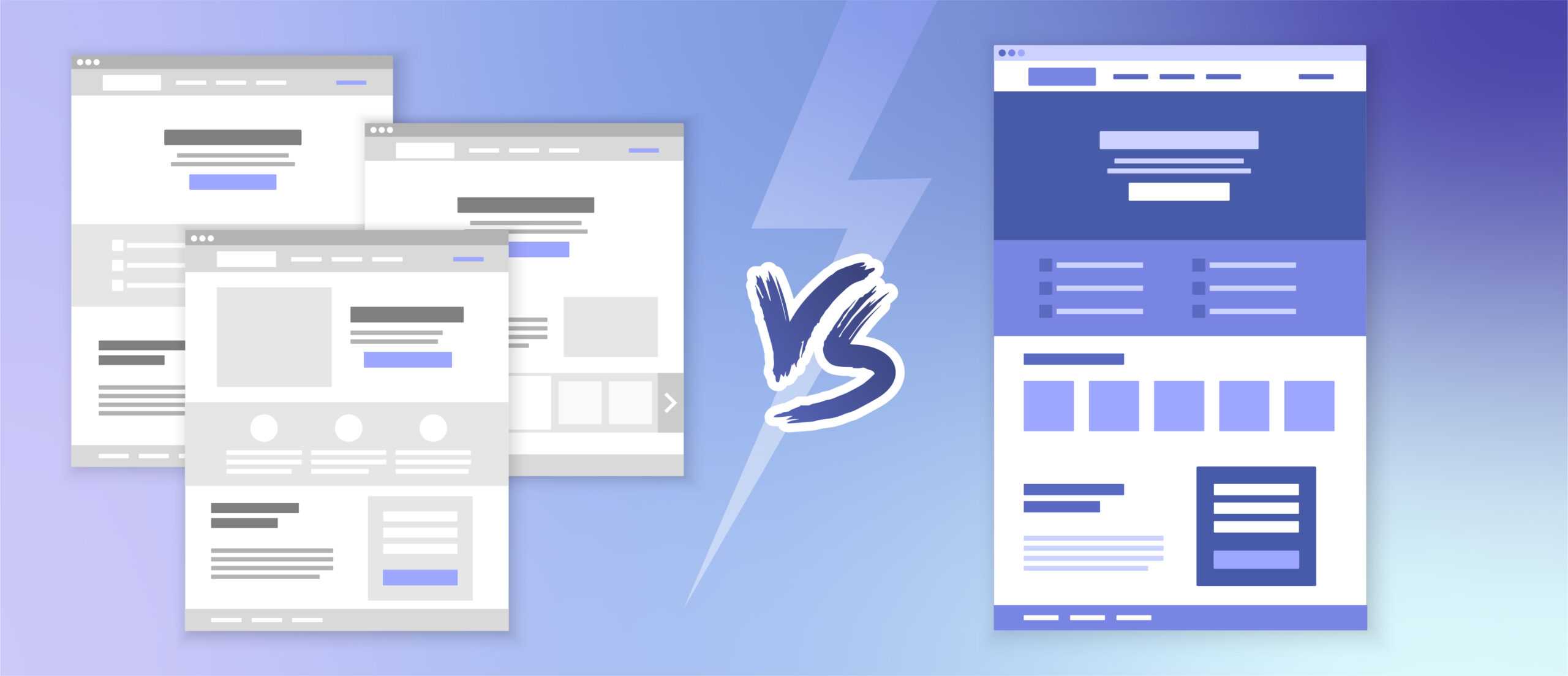In today’s digital landscape, a website is essential for showcasing your brand and attracting customers to your services or products. However, creating a complex, multi-page website can be daunting or unnecessary for many companies. This is where a single-purpose website can be a great alternative. If your company has a singular focus, a single-purpose website can help ditch the distractions and drive user action.
What is a Single Purpose Website?
Single-purpose websites (also known as “single-page” or “single-serving” websites) usually consist of a single page with a clearly defined goal or call to action. Unlike most typical websites, single-purpose websites lack a menu (or navigation mechanism) and have few (if any) additional page links.
A single-purpose website provides a streamlined user experience with all the information on one page. This type of simple website allows a company to create a linear narrative that leads visitors toward one specific purpose or goal. This can be particularly effective for promoting products or services without the distraction of multiple pages and informational noise that may pull the user’s attention away.
The advantages of a well-planned single-purpose website are evident to those who have used one. Traditional multi-page websites offer a plethora of information, but those sites may often take longer to navigate, and users may get confused and leave before completing the company’s objective. A single-purpose website can offer an easy-to-follow design that most users can use with minimal direction and a clearly defined goal that allows for a smooth user journey; no getting lost in irrelevant pages or browsing complex menus.

Top 4 Benefits
Single-purpose websites offer several benefits:
1. Mobile-friendly experience
One of the most significant advantages is an easy conversion to a mobile layout. With search volume from mobile devices exceeding desktop searches, mobile users expect a smooth web experience on their phones. It’s much easier for people to navigate single-page websites as those sites do not require clicking additional pages or tabs (which can be difficult on small devices). A single-page website with limited information also allows for a faster page load, which is crucial for SEO.
2. Straightforward user journey
A single-purpose website is designed to be simple, compact and easy to navigate. It’s a straightforward story with a beginning, middle and end. Because there are no additional pages, visitors won’t get lost or confused. This offers more straightforward control over user behavior, allowing website visitors to get all the information in the order that best aligns with your company’s goal.
3. Easily measurable results
Single-purpose websites enforce a simplified, streamlined structure that also extends to user behavior data. Unlike multi-page sites, where user journeys can get fragmented across different webpages, a single-page website can offer a clearer picture of how visitors engage with the entire site. This data allows for a better understanding of user behavior and the ability to quickly make adjustments to improve the user experience.
4. Lower startup costs
Compared to traditional multi-page websites, single-purpose websites are faster and more affordable to develop. That makes them perfect if your company is on a tight budget or timeline. They’re also straightforward to maintain, which means lower costs over time.
Single-purpose websites vs. landing pages
The main difference between a single-purpose website and a landing page is that a single-page site serves multiple purposes. A landing page usually focuses on one product or solution and a primary conversion goal (such as demo requests or email signups). Landing pages are also great for short-term campaigns, like upcoming events with a clear start and end date.
While single-purpose websites can be similar, they provide more of a “full story,” including company background information. They also have a longer lifespan without a pre-determined end date.
Potential Bottlenecks to Consider
Single-purpose websites can also have some drawbacks:
1. Limited advanced SEO strategies
If you try to include too many topics and subtopics on your single-purpose website, it may look disorganized and spammy. You won’t be able to structure your website’s content into subtopics or benefit from internal links. This can limit your website’s SEO strategy reach and, in turn, its search rankings.
2. Limited keyword targeting
Multi-page websites can target a distinct set of keywords on every page. Because single-purpose websites are usually designed around one central concept, they can only rank for a very narrow set of keywords. If your company relies heavily on finding new customers through Google or other search engines, then a traditional multi-page website will serve your business better.
3. Minimal long-term scalability
A single-purpose site has limited ability to scale because it focuses on a narrow range of ideas. If your company offers a wide range of products and services or plans to expand its online presence significantly in the future, a traditional multi-page website might be a better long-term investment.

Is a single-purpose website right for you?
A single-purpose website can be an effective marketing tool with thoughtful planning, but it may not suit every business. Before you consider building this type of website, it’s essential to determine your business goals. What do you want your website to accomplish?
Single-purpose websites are perfect for businesses with a single goal, such as portfolios, short-term event campaigns, single-product promotions or small businesses/agencies. However, for companies with more complex or multiple business goals, a single-purpose website may not provide enough information for visitors to make the right decisions.
Conclusion
If your business has a narrow focus and you only want your users to perform one task, a single-purpose website solution can be a great choice. Its mobile-first design approach, ease of creation and user-friendly experience make it an excellent option for businesses looking to get off the ground quickly.
However, single-purpose websites are unsuitable for companies with diverse goals and products that depend on SEO rankings and keywords. Traditional multi-page websites support multiple topics and allow you to reach a wider audience, implement complex SEO strategies, and write intricate content to attract organic traffic.
Let us help you analyze your business goals and what you want to accomplish with your website. Contact us today to determine whether a single-purpose website is right for your business needs.

